
Is improving your website’s presence on search engine ranking pages (SERPs) a crucial factor for your business’s success in 2023? Search Engine Optimization (SEO) is crucial for any business that wants to succeed in today’s cluttered digital space. But how do you know if your SEO efforts are paying off? The answer lies in tracking and analyzing the right SEO metrics.
Understanding and measuring important SEO metrics allows you to make data-driven decisions and improve your website’s search engine performance. So, whether you’re just starting out with SEO or looking to refine your strategy, this post is for you. Let’s dive into the seven most important SEO metrics for your website in 2023 that’ll help you to take your SEO game to the next level.
What is an SEO metric?
An SEO metric is a quantitative measurement used to evaluate a website’s performance in SERPs. These metrics help marketers and SEO managers evaluate the effectiveness of their SEO strategies.
SEO metrics can include a range of factors such as organic traffic, keyword rankings, backlinks, click-through rate (CTR), bounce rate, conversion rate, and dwell time. By tracking these metrics, website owners and SEO professionals can gain insights into their website’s performance and make data-driven decisions to improve their search engine rankings and online visibility.
Important SEO Metrics to Track & Improve
When evaluating your SEO success, you need to keep track of a few important SEO metrics. These metrics can help you understand what is going well and what isn’t and take timely decisions that can significantly help you improve your SERP ranking and retain it.
So, here are the SEO metrics to measure:
1. Organic Traffic
What it is?
Organic traffic refers to the visitors who visit your website through organic search engine results. This means that they find your website by typing keywords related to your business into a search engine like Google or Bing, and then click on one of the links to your website that appears in the search results.
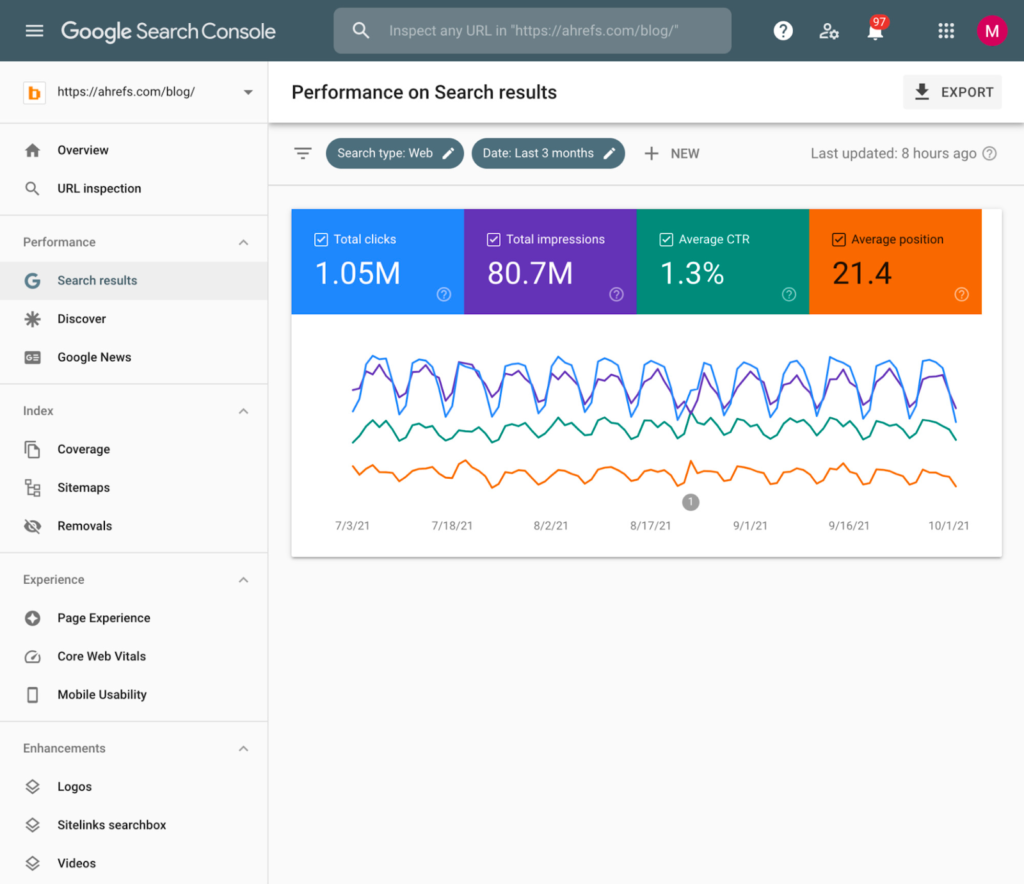
Why is it useful?
Organic traffic is useful because it’s highly targeted. Visitors who visit your website through organic search results typically seek information, products, or services related to your business. This means they are more likely to engage with your website and become customers.
How do you track it?
You can track your organic traffic using tools like Google Analytics, which provides insights into the number of visitors to your website, the sources of traffic, and other important SEO metrics. To track organic traffic specifically, you can filter your traffic by source and look for traffic coming from search engines.
How can you improve it?
You need to optimize your website for search engines to improve your organic traffic. This includes:
- Conducting keyword research and optimizing your content for high-potential keywords
- Creating high-quality, engaging content that attracts and retains visitors
- Ensuring your website is mobile-friendly and has fast loading speeds
- Building high-quality backlinks from authoritative websites
- Optimizing your website’s meta tags, such as the title tag and meta description, to improve click-through rates from SERPs
2. Keyword Ranking
What it is?
Keyword ranking refers to how well your website ranks for specific keywords in SERPs. For example, when someone searches for a keyword related to your business, your website may appear in the search results if it’s optimized for that keyword.
Why is it useful?
Keyword ranking is helpful because it helps you understand how well your website performs in SERPs for the keywords most relevant to your business. By tracking your keyword rankings, you can identify opportunities to improve your SEO and attract more organic traffic to your website.
How do you track it?
You can track your keyword ranking using tools like Google Search Console or third-party tools like Serpple ,Ahrefs or SEMrush. These tools will show you how your website ranks for specific keywords in SERPs and how your rankings change over time.
How can you improve it?
You need to optimize your content for high-potential keywords to improve your keyword ranking. This includes:
- Conducting keyword research to identify high-potential keywords to target
- Creating high-quality, relevant content that includes your target keywords
- Optimizing your content’s meta tags, such as the title tag and meta description, to include your target keywords
- Building high-quality backlinks to your content from authoritative websites
3. Click-through Rate
What it is?
Click-through rate (CTR) is the percentage of people who click on a link to your website after seeing it in SERPs or other online platforms.
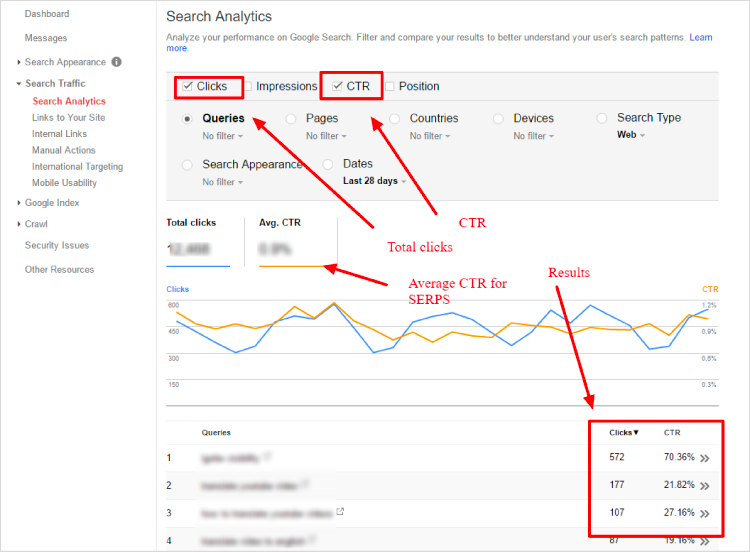
Why is it useful?
CTR is beneficial because it gives you insights into how well your website’s meta tags, such as the title tag and meta description, are performing in attracting clicks from potential visitors. A high CTR indicates that your meta tags effectively communicate your content’s relevance and value to potential visitors.
How do you track it?
You can track your CTR using tools like Google Search Console, which provides insights into the number of clicks your website receives in SERPs and the click-through rate for each keyword your website ranks for.
How can you improve it?
You need to optimize your website’s meta tags to improve your CTR. This includes:
- Creating compelling, relevant title tags that accurately describe the content on your website and include your target keywords
- Writing persuasive meta descriptions that provide a clear value proposition for potential visitors and include your target keywords
- Ensuring that your meta tags are concise and easy to read, with a maximum length of 60 characters for the title tag and 155 characters for the meta description
Other tactics that can help improve your CTR include:
- Using rich snippets to provide additional information about your content in SERPs
- Testing different variations of your meta tags to see which ones perform best
- Ensuring that your content delivers on the promises made in your meta tags and provides value to visitors
Insert pepper’s content services banner
4. Average Page Load Time
What it is?
Average page load time is the time it takes for your website’s pages to load completely. It includes the time it takes for all content on a page, such as images, text, and scripts, to load.
Why is it useful?
Tracking average page load time is useful because it impacts user experience and can affect your website’s search engine rankings. Slow loading times can lead to higher bounce rates, lower engagement, and fewer conversions, ultimately hurting your website’s performance.
How do you track it?
You can use tools like Google PageSpeed Insights, GTmetrix, or Pingdom to track average page load time. These tools provide insights into your website’s loading times, including recommendations for improving performance.
How can you improve it?
Improving your website’s average page load time involves optimizing various factors, including:
- Reducing the file size of images and other content on your website
- Minimizing the number of HTTP requests needed to load a page
- Using caching and compression techniques to speed up page loading times
- Optimizing your website’s code and scripts to reduce load times
- Choosing a reliable web hosting provider
5. Core Web Vitals
What it is?
Core Web Vitals is a set of user-centered metrics that measure the loading, interactivity, and visual stability of web pages. These metrics include Largest Contentful Paint (LCP), First Input Delay (FID), and Cumulative Layout Shift (CLS).
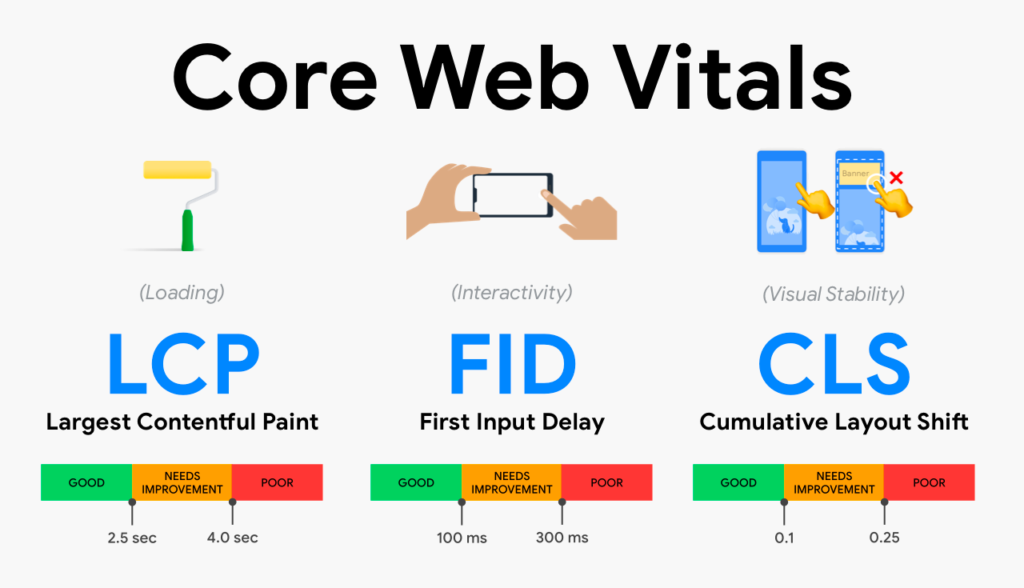
Why is it useful?
Tracking Core Web Vitals is useful because they provide insights into the overall user experience of your website. Google has also indicated that Core Web Vitals will be a ranking factor in its search algorithm from May 2021. This means that websites with better Core Web Vitals may receive a boost in search rankings, leading to increased organic traffic and conversions.
How do you track it?
To track Core Web Vitals, you can use tools like Google Search Console, PageSpeed Insights, or other website performance tools. These tools provide detailed reports on your website’s Core Web Vitals and recommendations for improving them.
How can you improve it?
Improving Core Web Vitals involves optimizing various factors, including:
- Reducing page loading times by optimizing images and other content on your website
- Minimizing the amount of JavaScript needed to load a page
- Prioritizing the loading of visible content on a page
- Avoiding layout shifts by reserving space for content that may load later
6. Backlinks & Referring Domains
What it is?
Backlinks refer to links on other websites that direct users to your website. Referring domains, on the other hand, refer to the number of unique websites with at least one backlink to your website.
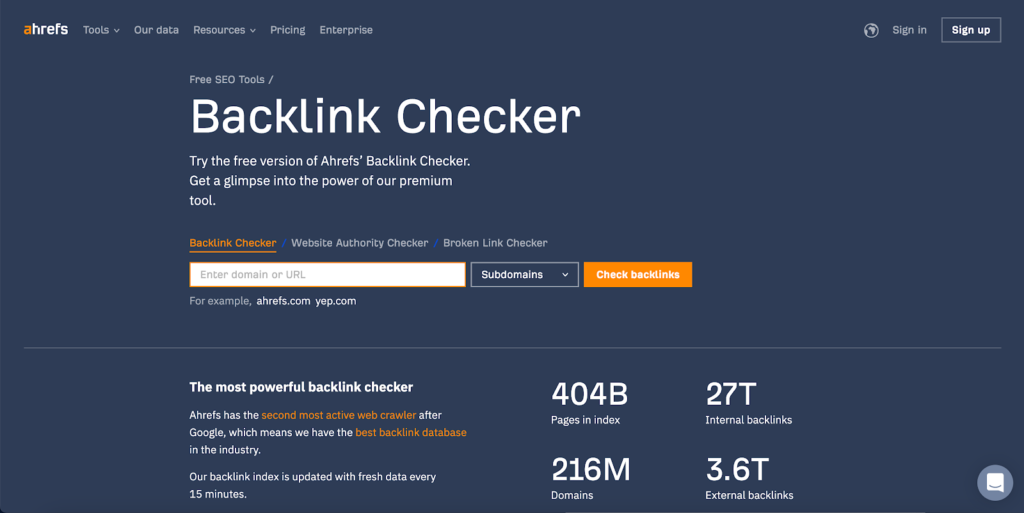
Why is it useful?
Tracking backlinks and referring domains is useful as they play a critical role, especially since Google’s E-A-T (Expertise, Authoritativeness, and Trustworthiness) algorithm update. The number and quality of backlinks to your website can help establish your website’s authority and credibility, which can increase its visibility in SERPs.
How do you track it?
There are tons of tools like Google Analytics, Ahrefs, SEMrush, Moz, and others to track backlinks and referring domains. These tools will help you understand the number and quality of backlinks to your website and the domains that are linking to it.
How can you improve it?
Improving backlinks and referring domains involves various tactics, including:
- Writing content that other websites will want to link to
- Reaching out to other website owners and asking them to link to your website
- Participating in online communities and forums and leaving links to your website in your posts
- Guest posting on other websites and including links to your website in your author bio
- Monitoring and disavowing low-quality or spammy backlinks that could harm your website’s reputation
7. Website Health Score
What it is?
The website health score is a metric that indicates how well your website performs in terms of technical SEO, user experience, and other factors that impact its overall health. This metric is available in Ahref’s site audit, reflecting the proportion of internal URLs on your website that do not have technical SEO errors.
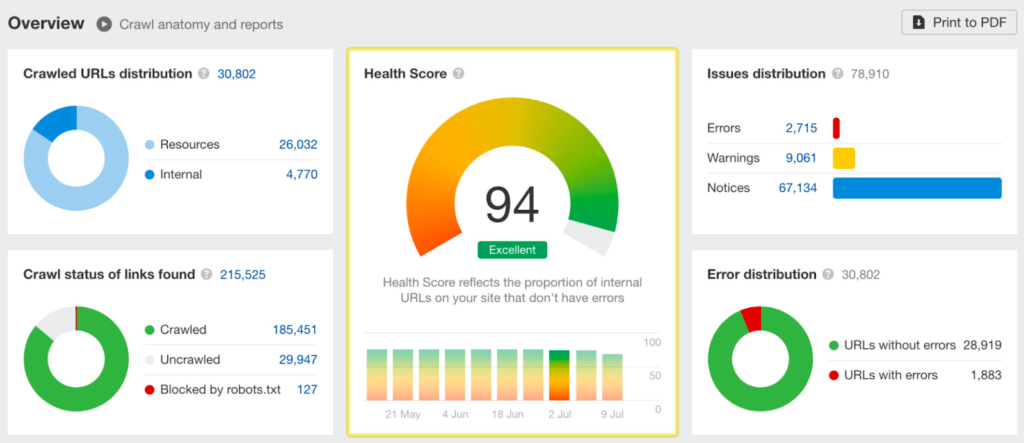
Why is it useful?
Tracking website health score is helpful because it provides an overall picture of your website’s performance and helps identify potential issues that could negatively affect your SEO efforts. It also gives essential notifications about crawl errors, distribution issues, and robot.txt errors that must be on top of your mind.
How do you track it?
Several tools are available to track a website’s health score including SEMrush, Ahrefs, and Moz. These tools evaluate various factors to determine the website health score, such as site speed, mobile-friendliness, security, and technical SEO issues to generate a score or report that indicates the health of your website.
How can you improve it?
Improving website health score involves various tactics, such as:
- Optimizing website speed and performance
- Ensuring mobile-friendliness and responsive design
- Implementing technical SEO best practices, such as proper URL structure and meta tags
- Improving website security with SSL certificates and other measures
- Addressing crawl errors and broken links
- Fixing any other technical issues that may negatively affect your website’s performance
Why should you track these SEO metrics?
As with any digital marketing exercise, SEO tracking metrics are crucial for understanding how well your brand is leveraging its content and SEO processes. Tracking important SEO metrics is crucial because:
- It helps you measure performance
By keeping track of your website’s SEO metrics you can measure the performance of your website and SEO strategies over time. For instance, you can monitor the organic traffic to your site and see how it changes over time. This helps you understand whether your SEO strategy is working or not.
- It helps you to identify areas of improvement
By analyzing SEO metrics, you can identify areas where your website is underperforming. For instance, you may notice that specific keywords need to be ranked better or that certain pages have a high bounce rate. This information helps you make changes to your website and SEO strategy to improve performance.
- It helps you make data-driven decisions
SEO metrics provide you with specific data points that you can use to make informed decisions about your website and SEO strategy. For example, you can use keyword research data to identify high-potential keywords to target or use backlink analysis data to identify link-building opportunities.
- It helps you understand your competition
You can also monitor your competitors’ performance in search engine rankings by tracking SEO metrics. Several SEO tools help you understand how you stack up against the competition and identify opportunities to improve your website’s search engine performance using keywords or strategies that your competitor is implementing.
- It helps you achieve your overall marketing goals
Ultimately, tracking SEO performance metrics is crucial because it fits into your overall marketing goals. Whether your goal is to increase online sales, generate leads, or increase brand awareness, tracking important SEO metrics helps you optimize your website. In addition, SEO helps you improve organic reach, increasing the chances of generating revenue.
To summarise the blog, you can gain valuable insights into your website’s performance by keeping track of important SEO metrics that measure organic traffic, keyword rankings, backlinks, and other vital factors. This empowers you to make data-driven decisions to improve your search engine rankings and increase your online visibility.
Remember, SEO is an ongoing process that requires consistent effort and attention. By tracking these metrics and continually refining your SEO strategy from time to time, you can stay ahead of the competition and achieve long-term success.
FAQs
The 7 most important SEO metrics to track are organic traffic, keyword rankings, backlinks, bounce rate, click-through rate (CTR), conversion rate, and dwell time. These metrics provide insights into your website’s performance, search engine visibility, and user engagement.
You can measure your website’s SEO performance using SEO tools such as Google Analytics, Google Search Console, Ahrefs, SEMrush, Moz, and more. These tools provide data and insights into important SEO metrics like traffic, rankings, backlinks, and more.
It’s recommended to check your website’s SEO performance metrics regularly, at least once a month. SEO metrics help you keep track of progress and identify areas for improvement.
The 4 pillars of SEO are technical SEO, on-page SEO, off-page SEO, and content.
Latest Blogs
Explore how Google’s 2025 AI search updates triggered ranking chaos. Learn actionable strategies to adapt your SEO for AI Overviews, zero-click searches, and SERP volatility. Stay ahead now.
Learn how to rank on AI search engines like ChatGPT, Perplexity, and Gemini by optimizing your content for authority, structure, and relevance. Stay ahead in AI-driven search with this strategic guide.
Explore the best healthcare SEO services for your medical practice. Improve online visibility and effectively reach more patients in need of your services.
Get your hands on the latest news!
Similar Posts

Content Analytics
8 mins read
Google I/O 2025: AI Search Shake-Up & Ranking Volatility

SEO
5 mins read
Top 10 Agencies for Banking and Financial SEO Services Industry

SEO
4 mins read